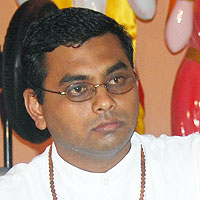From a satsang with Pt. Umadutt Maharaj, Spiritual Leader, SWAHA Bhakti Jyot Mandali
In these difficult times, many of us have been distanced from our families, friends, neighbours through social measures to prevent illness, as well as through the inevitability of death. In this life, the body must undergo six modifications: existence, birth, growth, maturity, decay and death. As Shree Krishna stated in the Srimad Bhagavad Gita, chapter 2, v. 13: “Just as boyhood, youth and old age are attributed to the soul through this body, even so it attains another body. The wise man does not get deluded about this.” This is the cycle of life, death and rebirth from which none is exempted. Therefore, we must apply the religious teachings as we proceed along this journey so that life will become a divine song.
Shree Raam said in Uttara Kaand of the Ramaayan when he returned from the forest, out of the 8,400,000 species of creation, the human form is the highest. We are in this worldly abode so that we may reach the doorway of liberation from the bondage of life and death. This human life is also the means to freedom from bondage to all negativities right here on earth. How do we achieve this? We must make the effort by performing the prescribed sadhanas. We must find the time to surrender to the feet of the Lord with humility, like the devotees Vibheeshan, Sutikshan Muni, Sevari Maata and Meerabai. We must believe in the Lord and perform all scriptural injunctions while doing our best to avoid the prohibitions. We must still perform our duties in grihasta ashraam (the householder stage of life) while knowing that the only reality is to be attached to divinity.
The question remains, how do we deal with the distance or loss of a loved one? Bhagavan Shankar explained to Parvati Devi how he dealt with Her loss in Her previous incarnation. Without his consort, Shivaji’s mind and heart were troubled and he wandered away from Kailash Parvat. While walking, he wandered through many beautiful woodlands, mountains, rivers and other scenic natural sights. However, seeing such enchanting sights only reminded Him of the Devi. Eventually, in the distance, he saw a majestic blue mountain, on which were four golden peaks. On each of the peaks was a gigantic tree: a banyan, peepal, mango and Indian fig tree. He reached the mountain and walked up a stairway encrusted with precious gems.
Then he saw a serene pond, enchanting to the eyes, with cool, sweet-scented water and blossoming lotus flowers of every variety. It was surrounded by fragrant flowers and shady trees. Swans were gliding on the pond, bees were buzzing and the breeze was rustling gently through the trees. It was a place of perfection. His mind was totally absorbed in the sights and sounds of the haven. In that spot He met kaak bhushundi, a crow who performed devotional service under each of the four trees during the four parts of the day: meditation, mantra jap, mansic (mental) puja and finally, religious katha. Bhagavan Shankar transformed Himself into a swan and listened to the Lord’s katha. His mind was then freed from all attachment to his departed wife. He then returned to Kailash Parvat, where His mind was free from dejection once more.
When near and dear ones are distant or departed, we must keep the mind stable. If possible, we should temporarily spend some time away from our abode. At the very least, we should turn our mind to other positive interests. Some turn to meditation, prayer, yoga or service to humanity. Whichever path we choose, we must always keep moving forward. Shivaji listened to the kathas of the Lord and gained peace of mind. Similarly, in our own lives, we may face many challenges, but there is always a religious solution if we seek the Lord.



